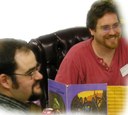
Determine if any differences are indicated from participation in shorter single sessions versus longer "campaigns" over different durations.

Determine if any differences are indicated from participation in shorter single sessions versus longer "campaigns" over different durations.
Does Easy Do It? Children, Games, and Learning By Seymour Papert From the June 1998 issue of Game Developer magazine, "Soapbox" section, page 88. Also included is a letter in response to Papert's article and Papert's response to that letter, both of which appeared in the September 1998 issue of the magazine. Reprinted with permission.
RPGs are well known to spark interest in reading, and may promote overall reading advancement. That being said, how much does the reading comprehension required for RPGs impact this overall advancement? Using "Adult" RPG Systems with youth, rather than "bringing down" a system to "their level". This is one anecdotal example that I can share, since it is my own kids, but I have seen repeated many times in practice with others, over the years. But have not (yet) run a controlled study to validate or negate these observations. Your thoughts and experiences?
We offer free accessible, inclusive, role-playing game (and sometimes cooperative music) programs, free and open to the public ages 5 to 105+.

Just the general overview theory I have about participation in RPGs. These ideas will be tested as I work out more detailed hypotheses to test these concepts for validity...

Here is the improved and enhanced audio/video of the presentation "The Therapeutic and Educational Uses of Role-Playing Games (RPG) as Intervention Modalities for Individuals and Groups from the Therapeutic Recreation Perspective" at Seattle Children's Hospital for the Washington State Therapeutic Recreation Association (WSTRA) 16th annual conference. The live version of this presentation was certified for Continuing Education Units (CEU's) by the American Therapeutic Recreation Association (ATRA). This the sound fixed, and includes the slideshow added to the video to be easier to read. Closed captions coming soon too.
By Tracy Raye Hickman This is the SECOND in a series of three articles which I wrote concerning Christian perspectives and misunderstandings about Role-Playing Games.
This is the THIRD in a series of three articles which I wrote concerning Christian perspectives and misunderstandings about Role-Playing Games, by Tracy Hickman. by Tracy Raye Hickman
There is an interesting thread regarding the Bodhana group and the use of role-playing games for therapy. I recently stumbled across it and have been enjoying the dialog. I thought I would share a snippet that might be helpful others to understand an example of how the use of RPG for therapy would be applied...
This is an early prototype version. There are newer, more complete and updated, versions created since this article was posted years ago. This is useful for various populations and professionals from other disciplines wishing to teach participants how to find and use civic resources (police, fire department, doctor, hospital, theater, etc.). This program is based on work at Eastern Washington University with oversight by Professor Emily Messina and others. It has been repeated with similar success when used other groups in private practice through non-profit RPG Research and the for-profit RPG Therapeutics LLC since.
This is an early prototype version. There are newer, more complete and updated, versions created since this article was posted years ago. This is useful for various populations and professionals from other disciplines wishing to teach participants how to find and use civic resources (police, fire department, doctor, hospital, theater, etc.). This program is based on work at Eastern Washington University with oversight by Professor Emily Messina and others. It has been repeated with similar success when used other groups in private practice through non-profit RPG Research and the for-profit RPG Therapeutics LLC since.
This is my first prototype rough draft in the development of role-playing gaming as a modality for therapeutic / educational interventions. For a Recreation Therapy course in which I am currently enrolled at Eastern Washington University, our task last week was to "Develop a Tabletop Leisure Education Game" for a group of Autism Spectrum (and other) adults in a facility near the Seattle area (we are in Spokane, WA). Of course I selected (with the approval of my assigned partner in the project, Tabletop Role-Playing Gaming (RPG ) for this assignment, in this case a 1940s Gumshoe Detective-style mystery set in urban Chicago...
An interview from some months ago, "FUN AND FUNCTION: HOW RPGS CAN HEAL YOUR MIND AND BODY" Posted on March 21, 2016 by Kit Partin...
An interview from some months ago, "FUN AND FUNCTION: HOW RPGS CAN HEAL YOUR MIND AND BODY" Posted on March 21, 2016 by Kit Partin...

If indicated viable from the research results of all the previous steps, define the requirements for a Game Master Therapist (GMT) or Game Master Instructor (GMI) in applying a role-playing game therapeutic or educational module.

Join the live broadcast Monday, July 11th, 5:00 pm Pacific time. The first episode in the monthly series on the benefits and uses of games...

I am currently in a course titled "The Psychology of Women" and we are covering various gender-bias topics. Recently on the CAR-PGa email list a link was sent related to gender-bias in gaming. Have you seen/experienced gender-bias related to gaming?
Over many years, the long term intention of RPG Research is to implement a series of studies using many different population groups meeting the following goals:

Tonight I begin play-testing the brand new Cryptomancer RPG by Chad Walker. It is a role-playing game specifically useful for teaching the basics of Information Security (InfoSec) to laymen (and professionals), in a fun way. It is first and foremost designed as a fun fantasy RPG setting (with the InfoSec twist), that just happens to teach basic InfoSec concepts and good (and bad) practices as a byproduct of participation.
HBO's VICE Media - At This Danish School, LARPing Is the Future of Education October 7, 2015, By Mike Pearl.
HBO's VICE Media - At This Danish School, LARPing Is the Future of Education October 7, 2015, By Mike Pearl.

I am trying to increase the geographic ability to provide RPG sessions for many populations around the North America. This will also later help improve the reach of research efforts, and then after that provide actual therapeutic programs using RPG in all forms to help with development and healing. The studies are the on therapeutic & educational effects of role-playing gaming (tabletop, live-action, & computer-based). Hoping folks see the benefit of helping to make this portable RPG research facility a reality. I know this is a reach, but thought it important enough to at least see if it can be made a reality. If not something you feel you could help with, please consider letting others know. Thank you for your time and consideration! - http://www.gofundme.com/rpgtrailer

Recently in a Facebook conversation regarding the Wheelchair Friendly RPG Trailer, I had some interaction with what turned out to be a troll. At first I thought it might be a legitimate interaction, but only too late was it clear they were otherwise... I thought it would be fun to post the interaction here for future reference.
This is for discussion and heavy revision from everyone (whole world welcome!) as we try to nail down these recommended guidelines.

If the early research data actually indicates causality, attempt to narrow and clarify the variables, looking for any differentiations in results...

Any of you following our 10 or so streams per week have probably heard RPG Research's founder Hawke Robinson state time and again that RPG publishers have set an unnecessarily high barrier to entry due to dependence on the mass-loading and mentor model in about 99% of role-playing games. This generally means that the vast majority of the world population is left out of the benefits of RPGs. We're fixing that, without dumbing down the game systems and their benefits!
Document Actions